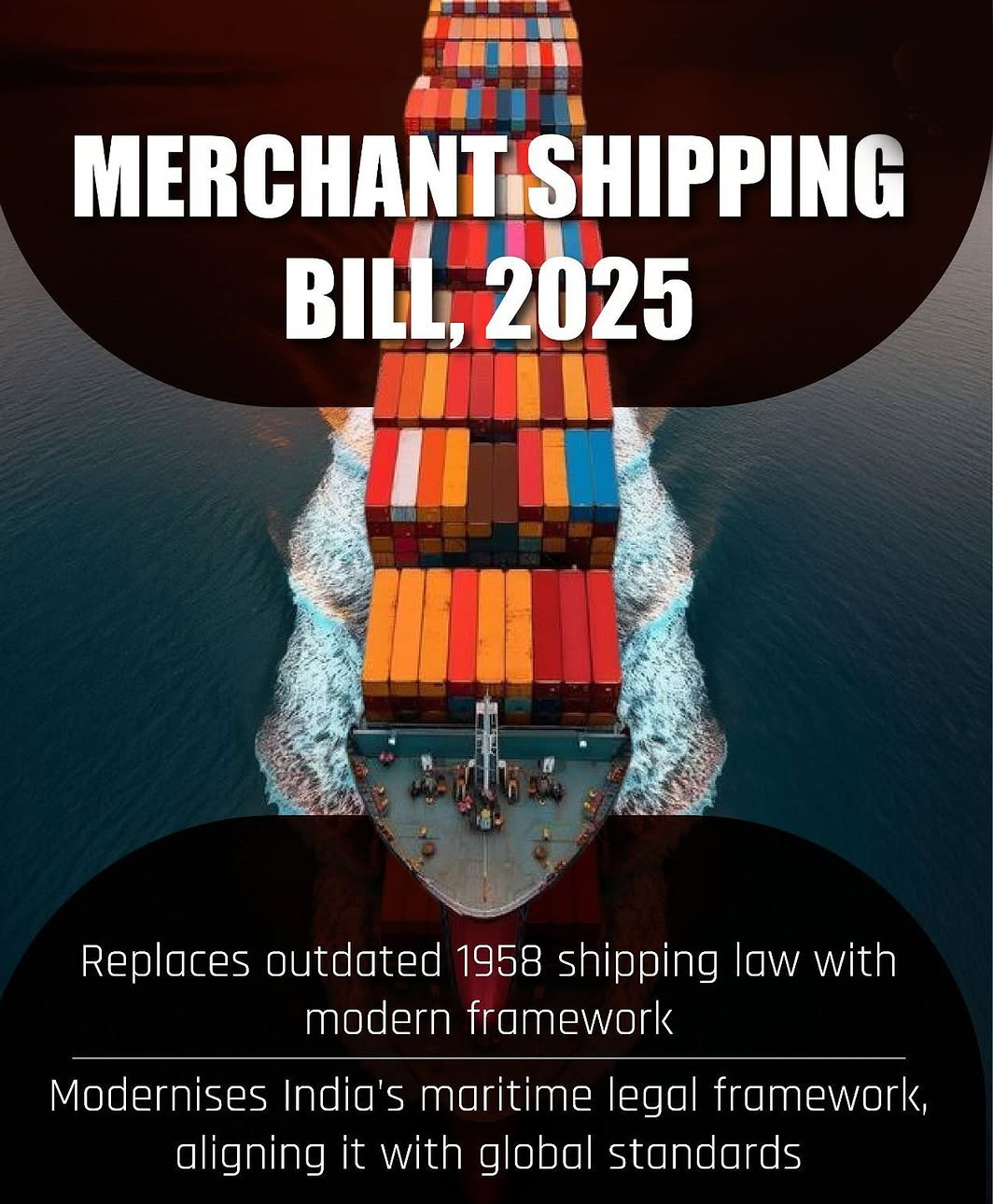Context:
Indian Parliament has passed the Merchant Shipping Bill, 2025, replacing the Merchant Shipping Act of 1958, marking a significant shift in India’s maritime governance and aligning the country’s legal framework with International Maritime Organisation (IMO) conventions and global best practices.
Background
The Merchant Shipping Act, 1958, though landmark in its time, had become outdated in light of technological advancements and evolving global maritime norms. The need for a modern, efficient, and globally compliant legal framework prompted the drafting of a new bill to:
- Improve the ease of doing maritime business in India.
- Enhance India’s competitiveness in the global shipping industry.
- Promote sustainability and safety in maritime operations.

Key Provisions of the Bill:
Mandatory Registration for All Vessels
· All vessels, irrespective of type of propulsion or weight, must be mandatorily registered.
· Temporary registration introduced for vessels undergoing recycling, enhancing safety and accountability.
Expanded Definition of “Vessels”
· Now includes mobile offshore drilling units, submersibles, non-displacement crafts, and more—covering emerging technologies and use cases.
Relaxed Ownership Criteria:
· Allows ownership by:
o Indian citizens,
o Indian-registered companies and cooperative societies,
o Overseas Citizens of India (OCIs), etc.
· Facilitates broader participation in the maritime sector.
Institutional Mechanisms Retained and Strengthened
· Continues with the National Shipping Board and National Welfare Board for Seafarers to promote safety, welfare, and policy coordination.
Renaming and Empowerment of Maritime Authority
· The Director-General of Shipping is now renamed as Director-General of Marine Administration.
· Empowered to regulate maritime education, training, and institutional standards.
Comprehensive Seafarer Agreements
· Broader coverage of parties involved in maritime operations.
· Ensures social security, fair working conditions, and welfare for Indian seafarers.
Stronger Environmental Regulations
· Mandates a Pollution Certificate for all vessels, regardless of size or tonnage.
· Reinforces India's commitment to preventing marine pollution and protecting coastal ecosystems.
Significance and Impact:
· Marks a paradigm shift from regulatory rigidity to a facilitative policy regime.
· Aims to revive domestic shipping and promote private sector participation.
· Supports India's ambition to emerge as a leading maritime nation.
· Complements other maritime initiatives like Sagarmala, PM Gati Shakti, and Blue Economy policies.
· Boosts India’s share in global maritime trade.
· Expected to generate employment, logistics efficiency, and contribute to GDP growth.
· Enhances strategic autonomy in maritime affairs, especially in the Indo-Pacific context.
· Harmonizes Indian maritime law with IMO conventions and international standards.
· Strengthens regulations on safety, marine environment protection, and seafarer welfare.
· Facilitates easier registration and operation of Indian ships. Aims to increase the number of vessels under the Indian flag, thereby enhancing national maritime presence.
· Enhances bankability and creditworthiness of Indian shipping firms.
· Expected to attract greater global investments into the Indian maritime sector.
Conclusion
The Merchant Shipping Bill, 2025 signifies not just legal reform but a strategic maritime repositioning of India on the global stage. By enhancing regulatory efficiency, promoting sustainability, and supporting economic growth, it is a vital component of India’s journey towards a Developed Nation by 2047.






